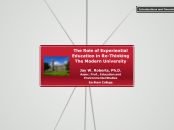によって Jay Roberts 11年前.
1349
The Role of Experiential Education in Re-Thinking The Modern University: Classrooms, Communities, and Collaborations

によって Jay Roberts 11年前.
1349

もっと見る
With modern technology, if all there is is lectures, we don't need faculty to do it," Redish says. "Get 'em to do it once, put it on the web, and fire the faculty." from: http://americanradioworks.publicradio.org/features/tomorrows-college/lectures/rethinking-teaching.html
Teachers as Curators of Experience
Sitting at the center of much of this is Experiential Education
Requires not just content mastery but process mastery
Design
Facilitation
Anyone can access the raw information and experience- teachers meaningfully organize it.
To curate: Organizing, framing, designing, and making meaning
I possess a device, in my pocket, that is capable of accessing the entirety of information known to humankind.
Cooperative Learning
Active Learning
Expeditionary Learning
Project Based Education
Community Education
Education for Sustainability
Place Based Education
Outdoor Education
Service Learning
Transformationalists
Critical
Social/Democratic
Individual/Romantic
Connect
Review
Demonstrate
Label
Experience
Enroll
Innovative forms of assessment focused on demonstrated learning outcomes
Scaffolding and sequencing across experiences
Capacity building in communities
Strong and deep reflective practices
Thematic, Interdsicplinary Curricula
Collaborations
Place and Problem/Project Based
High Impact Learning Initiative (Hoy, 2012)
Off-campus study programs
Student Leadership Development
Simulations
Isolated "active learning"
Service learning emerges
Clubs, organizations, etc
Part-Time Jobs
Volunteering
3 Key Findings
Parallel Processing
Simulations, active, authentic, social learning
Enrichment keys: feedback, relevancy, challenge
Complex, mutli-sensory immersion
Multi-modal instruction
Neuroplasticity
Ritual/Novelty
Importance of affective domains in learning
Stress and Threat
Metacognition
What does this mean for teaching?
Less is More
American Academy for the Advancement of Science: “As biology faculty, we need to put the “depth versus breadth” debate behind us. It is true today, and will be even more so in the future, that faculty cannot pack everything known in the life sciences into one or two survey courses. The advances and breakthroughs in the understanding of living systems cannot be covered in a classroom or a textbook. They cannot even be covered in the curriculum of life sciences majors. A more tenable approach is to recast the focus of biology courses and curricula on the conceptual framework on which the science itself is built and from which discoveries emerge. Such a focus is increasingly interdisciplinary, demands quantitative competency, and requires the instructor to use facts judiciously as a means of illustrating concepts rather than as items to be memorized in isolation. The time has come for all biology faculty, but particularly those of us who teach undergraduates, to change the way we think about teaching and begin to develop a coordinated and sustainable plan for implementing sound principles of teaching and learning." (2009)
Teaching process of learning over content
Make it overt
Explosion of brain research
"Reading" the brain- CAT, PET scans, MRI
"We have learned more about the brain and how it functions in the past two decades than in all of recorded history" (Wolfe, 3)
College Attendance: "In 1960, 392,000 students earned bachelor degrees. By 2007 that number had nearly quadrupled to 1.52 million."(Ferrall, 1)
Funding: Efficiency efforts and cost containment
Global recession and credit crisis (student loan debt in US exceeds total credit card debt for first time in 2012)
Globalism and an increasingly "flattened" world
The University of Nowhere
‘Place-based colleges’ are good for parties, but are becoming less crucial for learning thanks to the Internet, said the Microsoft founder Bill Gates at a conference on Friday. Five years from now on the Web for free you’ll be able to find the best lectures in the world. It will be better than any single university,” he argued at the Techonomy conference in Lake Tahoe, Calif. “College, except for the parties, needs to be less place-based.” from: http://chronicle.com/blogs/wiredcampus/bill-gates-predicts-technology-will-make-place-based-colleges-less-important-in-5-years/26092
High Speed Connectivity
Digital Citizens and New Knowledge Processes
MOOC's!
Stanford’s Sebastian Thrun made headlines in the fall of 2011 when his on-line Artificial Intelligence course enrolled over 160,000 students. According to the New York Times (“Harvard and MIT Team Up To Offer On-Line Classes,” May 2, 2012), Thrun’s new venture, Udacity, has enrolled 200,000 students into six courses thus far.
Distance learning, Video conferencing (Skype, etc), Wiki's, Crowd Sourcing, Social Media, etc.
It's too expensive (bad ROI)
"In 2009, spending by Americans for post-secondary education totaled $461 billion, an amount 42% greater than in 2000, after accounting for inflation. This $461 billion is the equivalent of 3.3% of total U.S. gross domestic product (GDP) and an amount greater than the total GDP of countries such as Sweden, Norway and Portugal." From: http://www.cnn.com/2011/12/02/opinion/vedder-college-costs/index.html
Too vocational
"The university has shaped itself to an industrial ideal-- the knowledge factory. Now it is overloaded and top-heavy with expertness and information. It has become a know-how institution when it ought to be a know-why institution." (Rowe, 129).
Lack of ethical imperative
Outdated teaching and learning model
"The modern curriculum teaches little about citizenship and responsibilities and a great deal about individualism and rights. The ecological emergency, however, can be resolved only if enough people come to hold a bigger idea of what it means to be a citizen" (Orr, 32).
Students leave college unprepared "In survey after survey, employers seem to agree that the skill they most want in future workers is adaptability. Those who hire complain that they often find today’s college graduates lacking in interpersonal skills, problem solving, effective written and oral communication skills, teamwork, and the ability to think critically and analytically. Employers say that future workplaces need those skills as well as degree holders who can come up with novel solutions to problems and better sort through information to filter out the most critical pieces." From: http://chronicle.com/blogs/next/2012/09/12/skills-gap-employers-and-colleges-point-fingers-at-each-other/
Arum and Roksa (2012)- Academically Adrift
Delbanco (2012)- College: What It Was, Is, and Should Be
Ferrall (2011)- Liberal Arts At The Brink
Bok (2006)- Our Underachieving Colleges